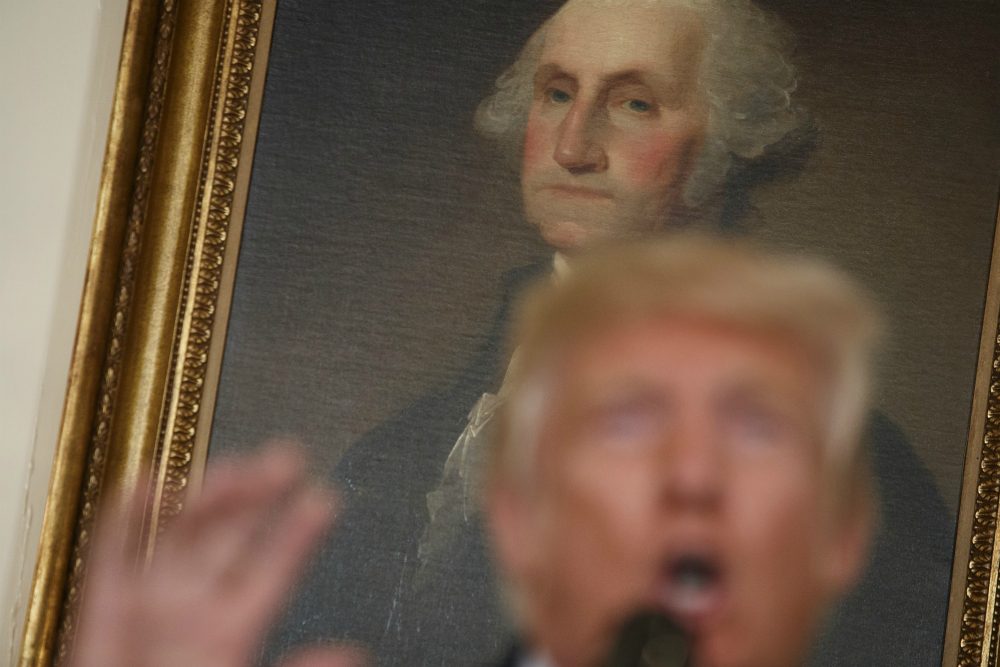Advertisement
Commentary
Donald Trump Is Incapable Of Being The President We Need

Maybe this is what happens when we elect a president who doesn’t sound like a politician.
Remember that one huge element of Donald Trump’s appeal, back in the 2016 campaign, was his language: The fact that he didn’t use the measured, circumspect tones we’ve come to expect from American politics. The familiar dances around controversial issues. The consultant-grade boilerplate language, designed not to offend.
Trump was designed to offend. That’s how he built himself up from a real estate mogul’s son to a tabloid mainstay and, later, a reality TV star. He learned what he learned and applied it to politics. And for many of his fans — well beyond his birther micro-base — his coarse speech throughout the campaign wasn’t a bug; it was a feature.
As Trump batted at the power structure and insulted everyone in his path, he became an irresistible mainstay of cable TV, winning millions of dollars in free advertising. But his rhetoric also separated him from the pack. For some, like the people marching with tiki torches in Charlottesville last weekend, it was a racist dog whistle. For others, it proved he wasn't one of those inauthentic, practiced politicians, the products of a Washington establishment that much of the electorate had been conditioned to hate.
For people who felt disenfranchised — who believed, sometimes with justification, that the power structure had long ignored them or let them down — what could be more satisfying than a candidate who wouldn’t listen to anyone’s advice? Who spoke in plain language from the gut? And if some of that language was baldly racist or sexist? Plenty of people found a way to excuse it. They told themselves that Trump didn’t mean precisely what he said. That it was an attention-grabbing act, or a shorthand for more nuanced ideas. Or a flaw worth tolerating to get the rest of the package: The chance to pursue an agenda, or lodge a loud complaint, or blow up the political structure altogether.
I’m sure many of those people — including House Speaker Paul Ryan, in his public declarations if not his deepest fears — believed that Trump would set his authenticity aside, at least a little bit, once he recognized the gravity of his new job.
There are times in life when we want a ritual, a set of common and familiar words of comfort ... It’s not something Trump will ever be able to do.
Since then, the volume of unpresidential language has been so strong and steady that it’s hard to keep track. And once in awhile, an unconventional voice might have its value. I don’t pretend to know the intricacies of the behind-the-scenes diplomacy on North Korea. But one factor in the drama is surely Trump’s un-diplomatic rhetoric on Twitter: the question of whether he’s crazy enough to act on what he says.
But then we get moments like this week. The president of the United States just doubled down on defending white supremacists. It’s hard to even write those words. And it’s hard to know whether Trump’s behavior is a peek into the darkness of his soul or a knee-jerk reaction to getting criticized. It doesn’t matter. Condemning Nazis is the simplest, easiest, most obvious thing in the world for a politician — or, really, a person — to do. (The much harder task is to parse and name the subtle examples of everyday racism in American culture.)
And what we needed from the president, at this moment, isn’t just the absence of an insanely offensive gesture. There are times in life when we want a ritual, a set of common and familiar words of comfort, however boilerplate they might be.
It’s not something Trump will ever be able to do. And it might still not be something his base wants or desires.
On July 2, an eternity ago in Trump years, I read through the customary Twitter conversations over his latest incendiary tweet — I think it was his sexist insult of MSNBC host Mika Brzezinski -- and came across this line from a Trump supporter: “Lol...i think it shows he is a normal person just like the rest of us instead of a suit who spews made up talking points to the camera”
Let’s parse that for a moment. Trump is not a normal person. He’s a singularity. Not every politician who embraces plain speech is going to cross so many lines. And if Trump’s electoral success emboldens some candidates to shed some of the caution and talk more honestly about issues, all the better.
But neither should we want a politician who feels free to behave “like the rest of us.” Talking points have their place, in those times when we need a leader — and those times when we need to talk like human beings.
